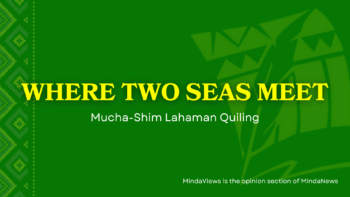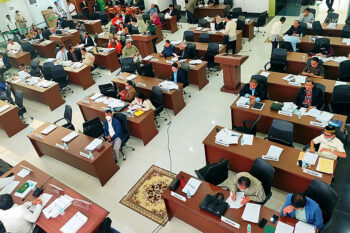GENERAL SANTOS CITY (MindaNews/08 March) – When Sulu Sultan Mohammed Jamalul Alam leased the Sultanate’s part of North Borneo to the British North Borneo Company in 1878 never did he know that he was signing a historic legacy – a deed in perpetuity that would haunt his heirs and two countries. One hundred and thirty-five years later, his heirs still see error not in the deed but in its violation; they blame the Philippines and Malaysia for not rectifying the error to their (the heirs’) satisfaction.
The heirs have been asking for the settlement of their claim of ownership of Sabah. Feeling doubly ignored by Malaysia in their petitions and by the Philippine government in their quest for help in pursuing their claim, they took the matter in their own hands – sending a small force to occupy the village of Tanduo, Lahad Datu in Sabah. Indeed, the gambit worked, attracting the attention of Kuala Lumpur and Manila; but, by the latest media reports the gamble would end tragically without satisfying the claim.
The claim or dispute is rooted in the lease of Sabah (then North Borneo) to an English trading company – the document originally “in Arabic” written not in Arabic alphabets but “worded in Malayan language” – abetted by conflicting translations and the arrogance of colonization. The original deed was a “pajak” (also: “padjak”), the Tausug and Malay word for “lease”. But, “locally, in North Borneo, [it] mean (sic) buy or lease all” – hence, also translated “grant” or “cession”. (Wikipedia: North Borneo [Sabah Issue])
The Land Grant
Done on “January 22, 1878”, the historic document entitled (in the Sulu version, in fact) “The Land Grant of 1878”, was the “Grant by the Sultan of Sulu of a Permanent Lease Covering His Lands and Territories on the Island of Borneo”. The treaty was written in Sulu, at the Palace of the Sultan Mohammed Jamalul Alam on the 19th day of the month of Muharam, A.H. 1295; that is on the 22nd day of the month of January 1878.
[NOTE: This copy of the lease or “treaty” is from “Operation Merdeka: Regaining Sabah”, by J. P. Sakuragi posted in his blog “Istoryadista”. Written in one block or paragraph, we are annotating the copy for easier reading and reference.
– PPD]
The Lessor:
We, Sri Paduka Maulana Al Sultan MOHAMMED JAMALUL ALAM, son of Sari Paduka Marhum Al Sultan MOHAMMED PULALUM, Sultan of Sulu and of all dependencies thereof, on behalf of ourselves and for our heirs and successors, and with the expressed desire of all Datus in common agreement, do hereby desire to lease, of our own free will and satisfaction,
The Lessees:
… to Gustavus Baron de Overbeck of Hong Kong, and to Alfred Dent, Esquire, of London, who act as representatives of a British Company, together with their heirs, associates, successors, and assigns
Terms of the Lease:
(1) … forever and until the end of time,
(2) … all rights and powers which we possess over all territories and lands tributary to us on the mainland of the island of Borneo, commencing from the Pandasan River on the east, and thence along the whole east coast as far as the Sibuku area, known as Paitan, Sugut, Banggai, Labuk, Sandakan, China-batangan, Mumiang, and all other territories and coastal lands to the south, bordering on Darvel Bay, and as far as the Sibuku River, together will all the islands which lie within nine miles from the coast.
(3) … In consideration of this (territorial?) lease, the honorable Gustavus Baron de Overbeck and Alfred Dent, Esquire, promise to pay His Highness Maulana Sultan Mohammed Jamalul Alam and to this heirs and successors, the sum of five thousand dollars annually, to be paid each and every year.
(4) … The above-mentioned territories are from today truly leased to Mr. Gustavus Baron de Overbeck and to Alfred Dent, Esquire, as already said, together with their heirs, their associates (company) and to their heir successors and assigns for as long as they choose or desire to use them;
(5) … but the rights and powers hereby leased shall not be transferred to any nation, or a company of other nationality, without the consent of Their Majesties Government.
(6) … Should there be any dispute, or reviving of old grievances of any kind, between us, and our heirs and successors, with Mr. Gustavus Baron de Overbeck or his Company, then the matter will be brought for consideration or judgment to Their Majesties’ Consul-General in Brunei.
(7) … Moreover, if His Highness Maulana Al Sultan Mohammed Jamalul Alam, and his heirs and successors, become involved in any trouble or difficulties hereafter, the said honorable Mr. Gustavus Baron de Overbeck and his Company promise to give aid and advice to us within the extent of their ability.
Attestation:
… This treaty is written in Sulu, at the Palace of the Sultan Mohammed Jamalul Alam on the 19th day of the month of Muharam, A.H. 1295; that is on the 22nd day of the month of January 1878.
Signed: Sultan of Sulu and his Datus
Notes and Questions
The lessor, Sultan Jamalul Alam, was the sovereign ruler of the Sultanate of Sulu; his datus who attested and signed the deed with him shared the Sultan’s sovereign powers. They leased not only the territory of North Borneo belonging to the Sultanate but also “all rights and powers we possess” over the territory (2).
QUESTIONS:
Did they not lease their sovereignty (powers) together with ownership (rights) over the territory? Does this mean that the lessees could use the resources of the territory as agreed and have the sovereign control of what to do with it?
As sovereign territory of the Sultanate, was North Borneo also the private property of the Sultan to be privately inherited by his heirs?
After the Sultanate of Sulu had ceased as a sovereign political entity and become a province of the Philippines, what personality and sovereign powers have his heirs as Filipino citizens to claim Sabah as a sovereign possession?
The lease is for “forever until the end of time” (1) [in the British version: “forever and in perpetuity]
It is said that the legal limit for a lease of territory between countries is 99 years. Hence, Macau and Hongkong were returned to China after the expiration of the 99-year leases.
QUESTIONS:
Was the lease of North Borneo illegal? What is its implication to the claim of the heirs of the Sultan?
Could this term of the contract (also called “treaty”) have been also a ground for Britain in insisting the contract was not a lease but a grant, sale or cession?
The lessees “together with their heirs, their associates (company) and their heir (sic) successors and assigns” could enjoy the lease “for as long as they choose or desire to use them” (4); however, there was a restriction: “but the rights and powers hereby leased shall not be transferred to any nation, or a company of other nationality, without the consent of Their Majesties Government” (5).
In 1881, British North Borneo became a chartered company. As such, it was tasked by the British government to administer North Borneo – both portions from the Sultan of Brunei and Sultan of Sulu. It developed North Borneo politically, economically and socially. With the local people and immigrants, it built towns and cities.
Chartered companies, as instruments for colonization, have limited sovereignty from their governments.
The lessees testified that they derived their sovereignty from the Sultan of Brunei and the Sultan of Sulu and the British prime minister affirmed this when he declared the government had tasked the Company only to administer North Borneo; yet, North Borneo became a British protectorate. In 1946, it became a crown colony then granted independence in 1963 before joining the Federation of Malaysia.
The transfer by North Borneo Company of its “rights and powers” to Great Britain in 1946 was considered a violation of the contract as stipulated (5), the turnover of the territory to Malaysia in 1963, consequently illegal.
QUESTIONS:
Did North Borneo Company violate the restriction agreed (5) when it transferred the lease to Great Britain considering its status as a British chartered company?
Was the lease transfer to Great Britain not consonant with (4) which Malaysia has assumed by continuing the payment of the yearly “rental/cession” money?
The lease was “for forever and until the end of time” (1) and for “the sum of five thousand dollars annually, to be paid each and every year” (3). There was no provision for any increase. The present heirs of the Sultan have been asking Malaysia to increase the rent to $855 million (MindaNews, February 24, 2013: The Sabah Standoff, a commentary by Amina Rasul).
QUESTIONS:
Who was the Sultan’s adviser? Could this very obvious disadvantage not have been amended earlier as provided in the contract (6)?
Can the contract be amended now with mere letters to the prime minister of Malaysia or through the intervention of the Philippine government?
135 Years After
One hundred thirty-five years after, North Borneo Company and the sovereign Sulu Sultanate are just memories. The heirs of the Sultan – in fact of rival Sultans – have been doing their best to maintain the prestige and the glory of the sultanate; that has not resurrected and will not resurrect the dead sovereign powers of the Sulu Sultanate. Has the 1878 Lease not died, too?
Surely, Malaysia would welcome the heirs of the Sultan accepting gracefully the death of the Lease and terminating their claim. But the heirs loathe doing that, oblivious of the fact that the Lease is their handicap. Well, then, says Malaysia, “Let’s continue the game.”
Some are wondering why Malaysia continues to pay the rent if Sabah belongs to it. The heirs cite the continuous payment of the rent as proof of their ownership of Sabah and they are asking Malaysia to increase the rent. In so doing, the heirs contrary to their presumption of illegality admitted as legal the lease transfer to Malaysia.
Malaysia holds that the transfer of the Lease to Great Britain, then later to her did not violate the Lease. By continuing the annual payment of the rent, she manifests her perpetual option and desire to use Sabah (4) preventing the heirs of the Sultan from taking Sabah back. And she will not increase the rent as there is no such provision in the Lease (3). The heirs can no longer seek remedy as provided in the Lease (6); they have no legal personality, as private Filipino citizens, to take their case to the United Nations or the International Court of Justice.
By the Lease, the Sultanate of Sulu retained ownership of Sabah; but the Lease made North Borneo Company the perpetual de facto owner of Sabah (1), (3), (4). Unless the Lease is amended, Malaysia’s perpetual de facto ownership of Sabah by succession will continue in perpetuity. And, the amendment is out of the question.
Metaphorically, the heirs of the Sultan say they own the cake; Malaysia eats it all. And, eating is the ultimate act of owning. What really matters – the owning or the eating?
The Lease is unknown to most nations today; however, they know Sabah is a state in the Federation of Malaysia, not just a de facto possession.
Even if the Philippines succeeds in pursuing the Sabah claim at the ICJ in her behalf and that of the heirs of the Sultan, the case will inevitably involve the right of the Sabahans to self-determination more than the proprietary right of the heirs of the Sultan over the territory. How will the Lease stand against the UN Charter and other pertinent UN resolutions?
The Lease was stacked in favor of North Borneo Company, a handicap of the heirs of the Sultan in the game called “Sabah Claim”. What a historic legacy! What irony of fate!
(“Comment” is Mr. Patricio P. Diaz’ column for MindaViews, the opinion section of MindaNews. The Titus Brandsma Media Awards recently honored Mr. Diaz with a “Lifetime Achievement Award” for his “commitment to education and public information to Mindanawons as Journalist, Educator and Peace Advocate.” You can reach him at patpdiazgsc@yahoo.com.)






